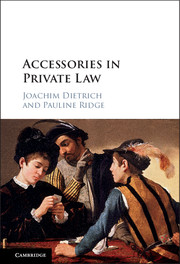Book contents
- Frontmatter
- Dedication
- Contents
- Foreword
- Preface
- Table of cases
- PART I General principles
- PART II Accessory liability in private law
- 5 Torts
- 6 Breach of contract
- 7 Infringement of equitable property rights
- 8 Breach of equitable duties
- 9 Infringement of statutory intellectual property rights
- 10 Other statutory wrongs
- 11 Wrongs involving companies
- PART III
- Index
7 - Infringement of equitable property rights
from PART II - Accessory liability in private law
Published online by Cambridge University Press: 05 February 2016
- Frontmatter
- Dedication
- Contents
- Foreword
- Preface
- Table of cases
- PART I General principles
- PART II Accessory liability in private law
- 5 Torts
- 6 Breach of contract
- 7 Infringement of equitable property rights
- 8 Breach of equitable duties
- 9 Infringement of statutory intellectual property rights
- 10 Other statutory wrongs
- 11 Wrongs involving companies
- PART III
- Index
Summary
Introduction
This chapter considers five doctrines that protect equitable property rights against interference by third parties and explains why they are not accessory liabilities, despite often being conceptually linked to accessory liability for procuring or assisting in a breach of trust. Each claim concerns the (often, but not always, wrongful) involvement, broadly speaking, of a third party, in a custodial relationship between a beneficiary and a trustee or fiduciary where that involvement relates to the property that is the subject of the trust or fiduciary relationship. Nearly all of these doctrines have at some time been grouped under the ubiquitous ‘constructive trust’ label [8.1.7]. It is challenging to disentangle them from accessory liability because they share similar rationales and elements to those of true equitable accessory liability and because none of them were necessarily conceived of with such classificatory concepts in mind. In particular, this chapter is concerned with one of the five doctrines considered, that is, equitable recipient liability: the personal fault-based liability that attaches to the recipient of property that is subject to a custodial fiduciary relationship and which has been received in breach of trust or fiduciary duty. Of the five doctrines, recipient liability is the one most closely related to accessory liability for procuring or assisting in a breach of trust. For that reason, its substantive content is discussed in Chapter 8 along with those accessory liabilities. Recipient liability is a contested doctrine; accordingly this chapter prepares the groundwork for Chapter 8 by explaining our understanding of recipient liability and why it should be considered in tandem with accessory liability.
Trustee de son tort
A third party to a trust who has trust property vested in him or her, or has control over the trust property, and who purports to act as a trustee in relation to that property, rather than as an agent or in a personal capacity, is accountable as though properly appointed as trustee. The so-called ‘trustee de son tort’ is a fiduciary who is subject to the usual duties of an express trustee and will hold all usual trustee powers. The trusteeship arises prior to any breach of the trust. As with express trustees, the trustee de son tort's liability for any ensuing breach of trust is strict; it is irrelevant whether he or she acted in good faith and without knowledge of the breach.
- Type
- Chapter
- Information
- Accessories in Private Law , pp. 199 - 216Publisher: Cambridge University PressPrint publication year: 2016



